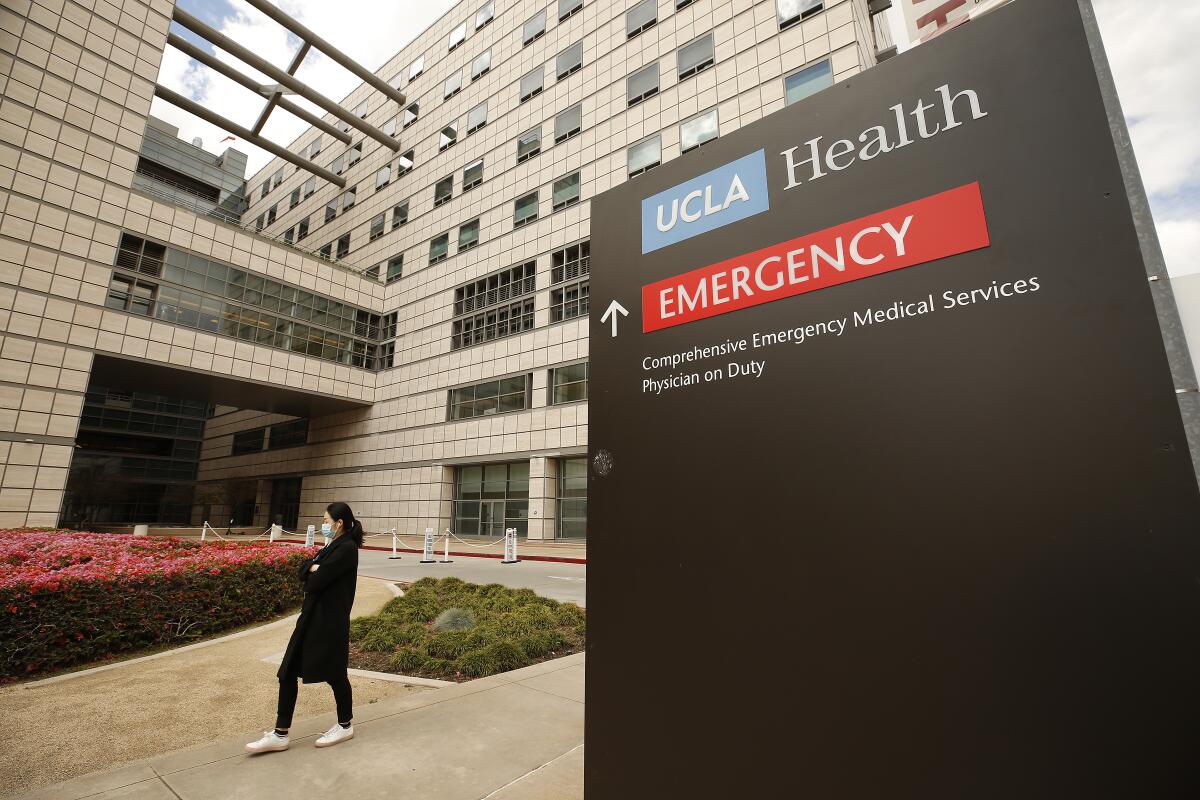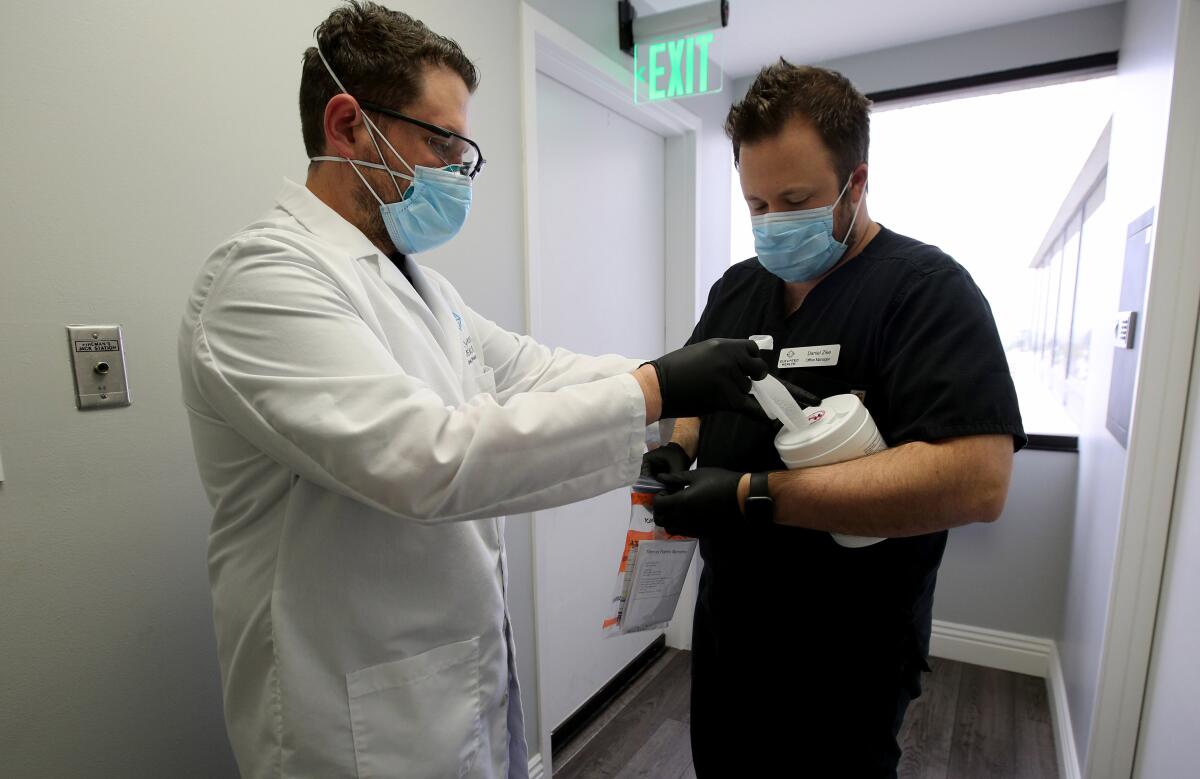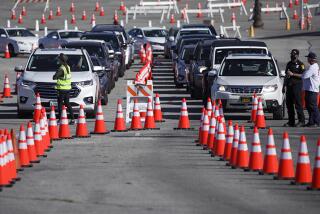Column: Here’s what to do if you think you have the coronavirus

So you’ve got some aches and pains, a rattling cough, and you’re beginning to panic because the problem could be you know what.
Should you take an aspirin, call your doctor or get yourself to the nearest hospital as soon as possible?
In the swirl of information about the coronavirus and with the death toll mounting by the hour, it can be hard to know the right response, and even harder to stay calm. So I reached out to an old friend for some straight talk.
Dr. Mark Morocco works in the emergency room at Ronald Reagan UCLA Medical Center, and he’s one of thousands of heroic medical staffers worldwide trying to stem the spread of the pandemic, sometimes at great personal risk.
We don’t know how bad things will get, Morocco said, but it’s critical to limit the spread of the virus by honoring the calls for social distancing — and by not rushing to the hospital if we feel a bit under the weather.
“Right now, we’re still seeing way too many people showing up … saying they want testing and need treatment that doesn’t exist,” Morocco said.
None of that is helping, he said. It doesn’t help already-stressed hospitals and medical staffs, and it doesn’t help patients who probably don’t have the virus and certainly don’t belong in the hospital. That’s where the truly sick people are, Morocco says, so steer clear if you can.
Even for most people with coronavirus, Morocco said, an ICU bed isn’t necessary. You’ve got to be really sick, he said, to go to the ER. He understands the anxiety out there, though, especially since coronavirus can look and feel a lot like flu. (The coronavirus cough feels like a dry burn, he said).
So how do you determine when to seek help, or when you need hospitalization?
“If you’re unable to get out of the Barcalounger and walk three steps to the bathroom,” Morocco said, you’re sick enough to get immediate help. “If you can’t think clearly and can’t breathe and speak normally … that’s a reason to come in.”
Otherwise, Morocco said, you’re better off staying home.
Even if you do have the coronavirus.
Don’t take chances, and seek medical help if necessary. But unless symptoms are severe enough to require a ventilator or urgent medical procedures, Morocco suggests that you set up a “sick” room at home to distance yourself from others.
If you can still eat and drink, those are good signs, Morocco said. And he advised that you do what grandmas did back in the day. Make some chicken soup, because water and salt make for a good IV fluid. And put some bleach into a bucket and use it to sterilize everything.
Since it’s always good to get a second opinion, I also checked in with Dr. Joe Risser in San Diego, who has been screening patients with coronavirus-like symptoms and determining whether they need to be hospitalized.
Risser agreed 100% with Morocco. Sick patients may just have the flu, he said, and even if it’s the coronavirus, staying home might be the best plan unless symptoms are severe. And yet there’s so much anxiety, patients are needlessly worrying themselves and taking risks by visiting a clinic that, even though sanitized regularly, is still full of sick people.
“This might sound a little harsh, but I think there are some people who want to be the first on the block to test positive for coronavirus. You really get that impression from people who have no symptoms but say, ‘Well, I just want to know,’” said Risser, one of 12 physicians at San Diego Family Care.
Risser said he has had some patients test positive, but with too few tests to test everyone, he’s following the guidelines, which means he’s telling many patients they don’t need to be tested.
“The state recommends people not be tested unless they’re moderately sick,” said Risser, a preventive medicine specialist.
“I can’t tell you how many times people tell me they have a fever and I ask how high it is. They say it is 99 or 100, and the next question I ask is, ‘Do you have a thermometer?’ They say no and when you ask how they knew, the response is … it felt like a hundred,” Risser said.
Risser, a clinical researcher, has been checking reliable medical sources for all the latest statistics on the coronavirus, and he made a trenchant observation. As of Monday, 378,000 people worldwide had tested positive for the coronavirus and 16,500 had died. By contrast, in the current flu season in the United States alone, 360,000 people have gotten sick and 22,000 have died.
They aren’t equivalent, of course, since the coronavirus seems to be far deadlier than flu, and since there is no vaccine or treatment yet.
“As a preventive medicine doctor, it drives me bananas that people don’t get a simple flu shot,” Risser said. “People are asking when we’re going to get a coronavirus vaccine. Well ,we have a flu vaccine now and I talk to people until I’m blue in the face about getting a flu shot.”
Risser had a few optimistic notes, saying the pandemic might help the medical community develop better forms of telemedicine, so patients can get needed advice when they can’t or shouldn’t visit a clinic or hospital. And he thinks there’s a good chance California Gov. Gavin Newsom’s prompt call for everyone to stay home will limit the spread of the virus.

When he first reached out to me by email last week, Risser said friends, family and patients have thanked him for being on the front lines. “I don’t feel deserving of so much gratitude,” he wrote, saying that lots of people in various walks of life have sacrificed and pulled together. “I’m doing what I signed up to do.”
Maybe so, but that doesn’t mean the rest of us shouldn’t be grateful to those who devote themselves to helping the sick, the frail, the injured and the dying. The nightly shows of public support for the profession in parts of Europe have been inspiring at a time when our vulnerability has been laid bare.
When I met Morocco, he had given up a career as an actor and screenwriter to attend medical school after getting into a serious car accident. He was inspired by an emergency room doctor and a trauma surgeon who helped save his life.
I spent his last night of school with him, watching him work a shift in the County-USC emergency room and helping a medical team that saved the life of a gunshot victim. He’s worked in a lot of emergency rooms since then, and for a while would get off work as medical supervisor on the set of the TV show “ER” and drive to a real emergency room to pull another shift.
Monday morning, he thought back on the car accident that inspired his career change.
“This moment,” Morocco said, “this kind of moment, is the reason I decided to become a doctor.”
More to Read
Sign up for Essential California
The most important California stories and recommendations in your inbox every morning.
You may occasionally receive promotional content from the Los Angeles Times.











